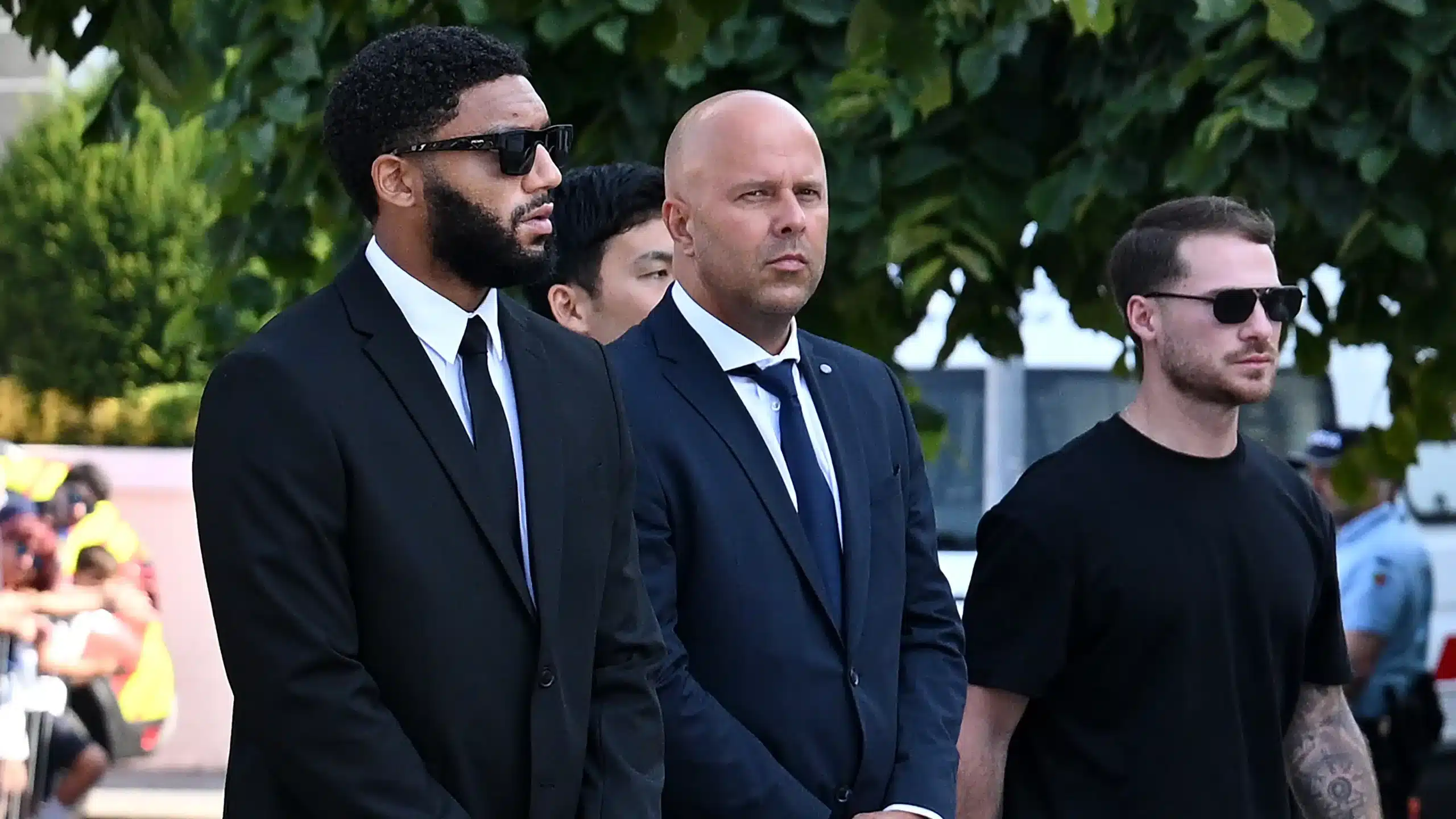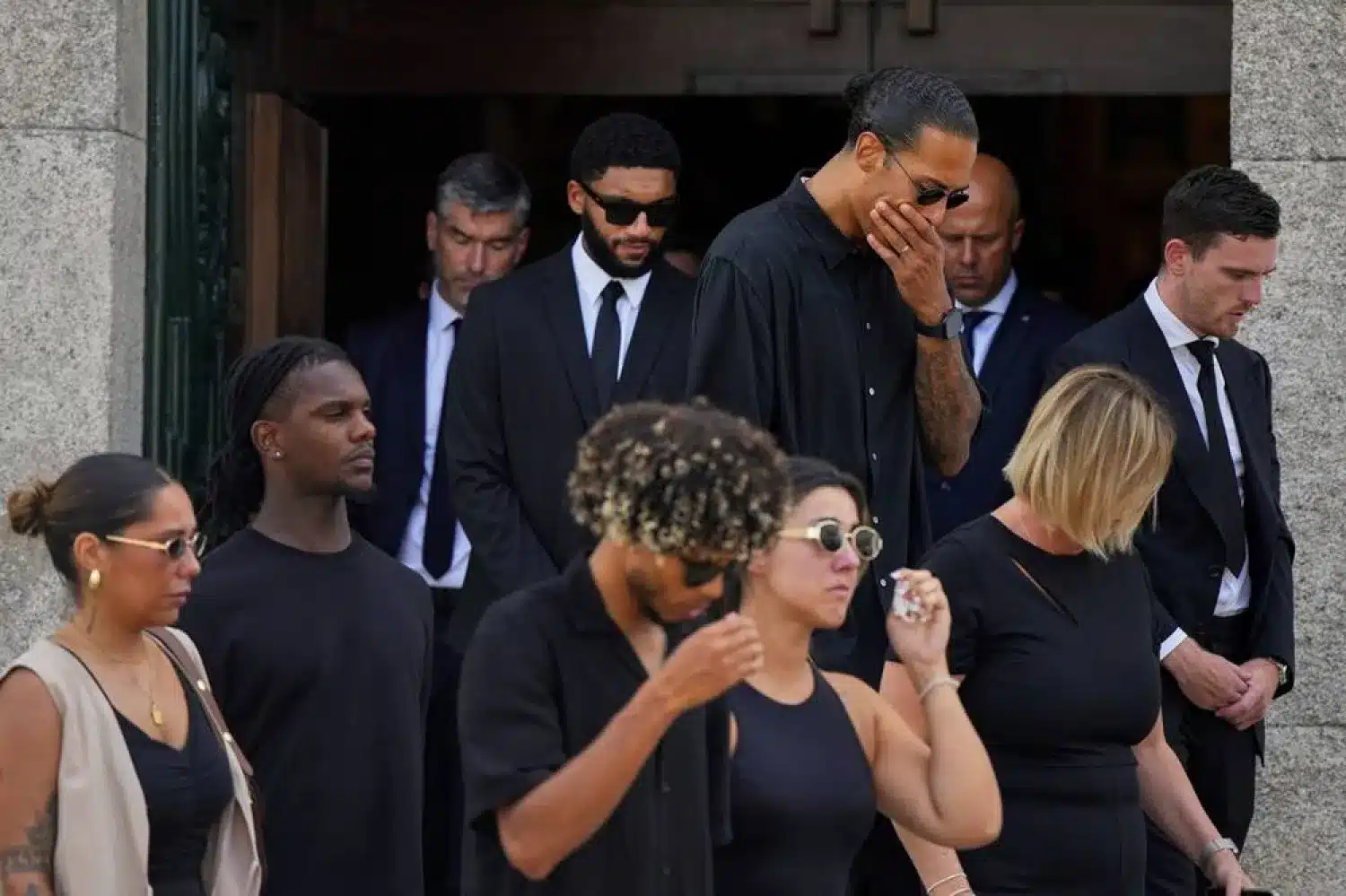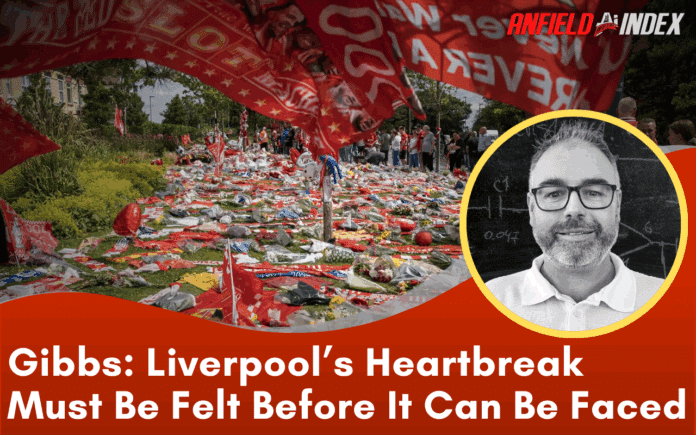Grief Moves at Its Own Pace and Football Must Wait
This is more than a difficult moment. It is a wound. The Liverpool family is grieving the sudden, tragic loss of Diogo Jota and his brother Andre Silva. A club that thrives on rhythm and noise now finds itself in quiet reflection. Fans have filled the exterior of Anfield’s main stand with shirts, scarves, flowers and notes. It is not the usual hum of matchday or transfer talk. It is stillness. It is mourning.
Some of the squad flew to Gondomar, near Porto, to attend the funeral. Virgil van Dijk, ever the leader, carried a wreath in the shape of a football shirt with the number 20 picked out in white. Andrew Robertson stood beside him with another wreath, this one bearing the number 30 in honour of Andre Silva. Only weeks before, Robertson had attended Jota’s wedding in the same city. Now he was walking behind his coffin.
Grief has no timeline. There is no plan to follow when a player dies in such a cruel and senseless fashion. This is not something anyone at Liverpool could have prepared for. And yet, in just over a month, the new season begins. The clock will keep ticking. Fixtures will be played. But football, in the most honest sense, cannot resume properly until this loss is acknowledged, respected and felt.
Slot Must Lead With Humanity, Not Systems
Arne Slot had only just begun laying the foundations of his Liverpool reign. Winning the Premier League in his first season was a remarkable achievement, but trophies do not insulate anyone from grief. Slot stood silently at the funeral beside his players. His face told the story. This was not a manager calculating his next move. This was a man trying to make sense of something that makes no sense at all.
He had planned to begin pre-season by welcoming new signings, including Florian Wirtz and Jeremie Frimpong. He had a coaching team to bed in and tactical changes to implement. That all feels secondary now. The biggest task is not shaping formations or managing minutes. It is guiding people through sorrow.

Slot’s role now involves understanding who needs to talk, who needs to train, who needs to step away and who needs to be left alone. This is leadership beyond football. The players are not machines. They are not expected to simply return to Kirkby and click into gear. There will be an empty locker. There will be no Jota in the passing drills. The loss will sit in every room and echo in every conversation.
There is no way to carry a squad through this with performance targets or motivational speeches. Slot must show patience, care and realism. Some players may find comfort in the routine of training. Others may struggle just walking through the door. Both are understandable. What matters is that each of them is seen and supported, no matter where they are in the grieving process.
Players Are Human Before Anything Else
Supporters often speak of footballers as though they are invincible. We describe them in terms of bravery, composure and steel. But bravery is not found only in taking penalties or winning headers. Real courage is found in showing up when your heart is broken. It is found in admitting that you are not ready. It is found in allowing others to see that you are in pain.
Mohamed Salah shared his fears publicly. He was frightened to return. Not because of injury or pressure, but because facing the reality of Jota’s absence would be too much. That fear is entirely human. And it is shared.
Every player in this squad has experienced loss in their life. But losing a teammate in this way is different. There was no goodbye. No closure. Just a message, a call, and a new empty space where someone used to stand. This kind of grief does not follow a pattern. It comes in waves, without warning. Some players will hold it in. Some will break. Every reaction is valid.

And this is not a grief that can be solved. It can only be carried. Over time, Liverpool will find a rhythm again. But that rhythm will never sound the same. The laughter in the canteen, the voice in the dressing room, the smile during training; these things matter. And they are now memories.
The club is offering mental health support. That is essential. The idea that footballers must be emotionally bulletproof is outdated. This generation is more open. They talk, they cry, they listen. They need that now more than ever.
What Football Looks Like Now
Liverpool are set to play Preston North End in a few days. A pre-season match, on paper. But this will not feel like football. It will feel like a vigil in motion. Over 5,000 fans will travel. They will not be watching for goals or shape. They will sing Jota’s name. They will hold scarves high. They will remember.
The new signings will likely feature. Wirtz, in particular, will draw attention. But no one will be asking him to shine. This is not a stage for debuts. It is a space for grief, for honouring the player who should have been there too.
In time, Liverpool will compete again. They will chase another title. They will try to defend what they won last season. And when they score, they will point to the sky. When they train, they will think of No 20. They will play, eventually, for Diogo Jota.
This journey will be different for every player. Some will find new purpose in honouring their teammate. Others will need time and care to feel part of the game again. Slot’s job is to guide them all, without forcing anything. The pressure of the Premier League must wait. Humanity comes first.
This is not about moving on. It is about moving forward with the memory intact. Carrying the loss, not covering it up. Accepting that a piece of the squad, a piece of the club, will always be missing.
The season will come. Matches will be played. Goals will be scored. But for Liverpool, this season starts in silence, with heavy hearts and tearful eyes.
Diogo Jota helped Liverpool win. In time, his teammates will want to win again. Not just because that is what they do, but because that is what he would have done.



